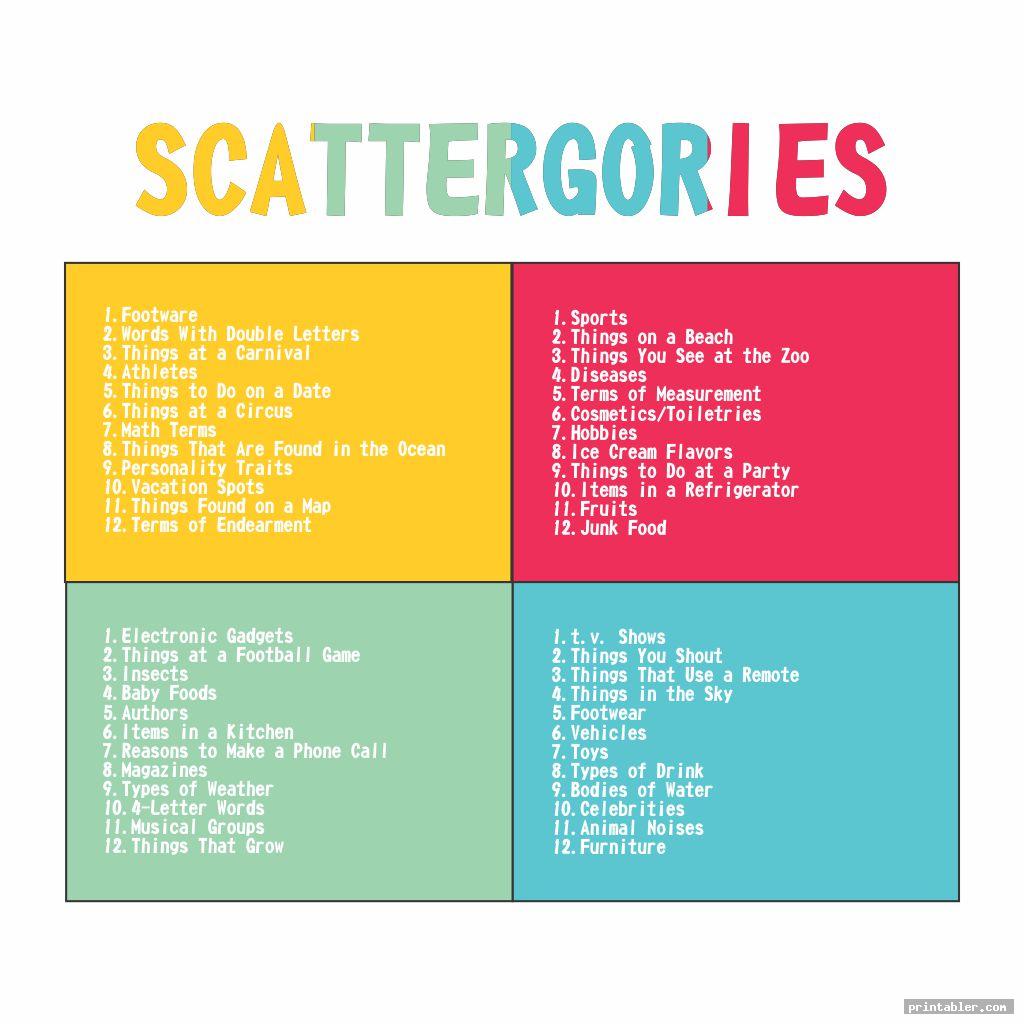

In order to keep players interested, Scattergories has embraced the power of the internet. Scattergories' accessibility was improved by these digital modifications, which also let it reach a larger audience. Now available on smartphones, tablets, and PCs, the game allows users to compete against computer-generated foes or challenge their friends and family online in multiplayer settings.

Then the modifications demonstrated the adaptability of the game and let participants explore their areas of interest.Īdditionally, technological developments resulted in the development of Scattergories' digital counterparts. These editions offered themed variations centered on certain subjects like sports, films, or even historical eras. In order to appeal to various interests and demographics, Hasbro released new editions and expansions. Because points are only rewarded for unique solutions, the goal is to conceive of less frequent answers that others are unlikely to duplicate.Īs Scattergories grew in popularity, it received a number of modifications and upgrades to improve the gameplay. The game is meant to challenge players to come up with unique responses within a specified category, all of which begin with a specific letter. Scattergories' premise centers around testing players' abilities to think fast, creatively, and critically. The game rapidly garnered popularity and became well-known among the masses because of its distinctive and captivating gameplay. In 1988, Milton Bradley, a reputable game maker (currently owned by Hasbro), introduced Dapra to the public. This feature of the game encourages creativity and pushes players to think in new ways, broadening their horizons and generating a sense of personal progress.ĭave Lowe and George E are the individuals credited with the invention of Scattergories. It provides an environment in which unexpected and inventive responses are appreciated, allowing individuals to exhibit their unique ideas. Scattergories also encourage participants to accept their uniqueness and think creatively. For instance, if the letter is "P" and the category is "Things Found in the Kitchen," choosing a more creative response like "Pastry Cutter" or "Popsicle Mold" might earn you more points than choosing "Potato" or "Plate." This takes using one's imagination and understanding, drawing links between the chosen letter and categories that others would pass over. One strategy is to think creatively and steer clear of the obvious solutions that the majority of participants will probably provide. Players must use a variety of methods that increase their chances of scoring points if they want to succeed in Scattergories. Why Scattegories game need strategies and creativity? The time constraint gives the situation a sense of urgency, creating excitement and forcing players to think fast and imaginatively. The next step requires players to work quickly against the clock to come up with a distinct response for each category that begins with the selected letter. Following the determination of the letter, a card with twelve distinct categories-including "Famous Actors," "Things Found in a Park," and "Types of Food"-is selected. The "category die," a 20-sided die used in the game, selects the particular letter for each round. The letter "S" with the category "Animals," for instance, can prompt players to think of solutions like "Snake," "Sheep," or "Squirrel." It might be difficult to come up with uncommon solutions because only responses that have not been used before will receive points. The idea is to come up with fresh and distinctive responses that are unlikely to be used by other participants. Each player or team must come up with solutions to a number of categories within a set amount of time that begins with a particular letter. With two or more players, teams can be formed or individuals can engage in Scattergories. It does this by fusing strategy, knowledge, and imagination.

Scattergories delivers an unmatched experience that transcends decades and unites people for fun-filled nights of laughing. This quick-witted game, which is meant to test participants' quick thinking, has enthralled innumerable people and groups all over the world. Scattergories has established itself as a popular board game and party activity that encourages fast thinking, quick reactions, and a ton of inventiveness.


 0 kommentar(er)
0 kommentar(er)
